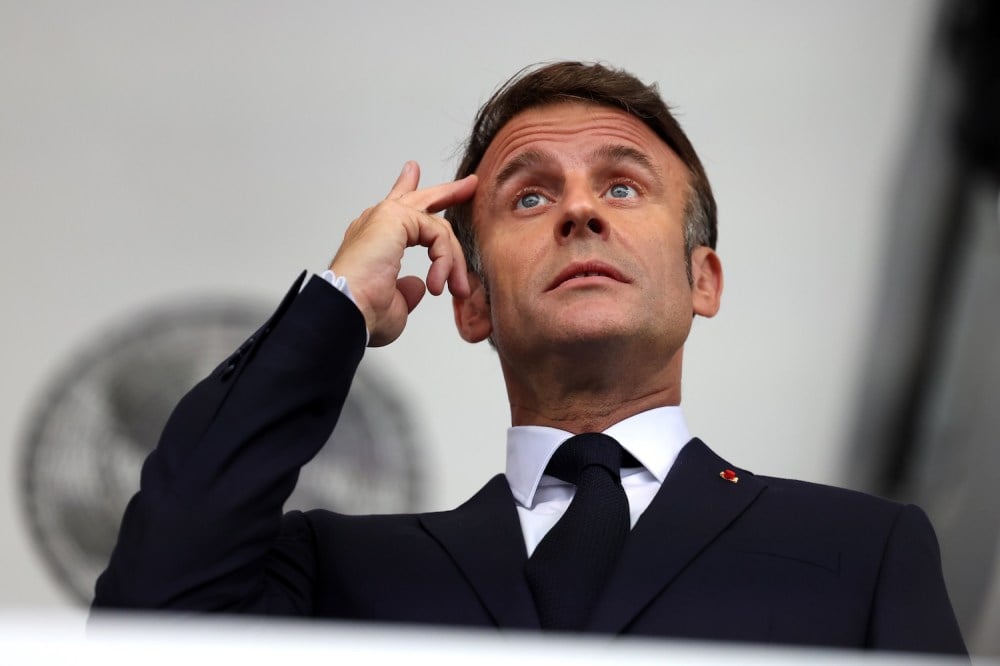France finds itself yet again mired in a political crisis. Prime Minister François Bayrou, unable to secure a majority of votes in the National Assembly in favor of his proposed austerity budget, has called for a vote of confidence on Monday, Sept. 8—a vote he is all but certain to lose. If the government falls, France will have run through four governments since President Emmanuel Macron’s reelection in 2022.
Will Macron respond to this latest political crisis by again dissolving parliament, as he did when faced with a similar impasse in the summer of 2024? Or will he be forced to resign, as influential voices across the political spectrum are urging him to do? Neither seems to offer a solution for France’s political impasse—but nor does any foreseeable alternative.
Macron himself created the impossible position he now finds himself in. France has been saddled with a hung parliament since June 2024, when he dissolved the National Assembly in the hope of halting the seemingly inexorable rise of the far-right Rassemblement National (RN), the party of his two-time presidential rival, Marine Le Pen. The move backfired: The RN won more seats than ever before, and no stable majority coalition has emerged over the past 15 months.
If Bayrou’s government falls on Monday, the constitution allows Macron to dissolve parliament again. If he does, however, he will still find himself on the horns of a dilemma.
On the one hand, the RN could this time win enough seats to oblige the president to appoint Jordan Bardella as prime minister. Since Macron has always presented himself as the only French political leader capable of halting the rise of the far right, this would mark the ultimate failure of his presidency, even if he limps on for another year and a half as the nominal but powerless head of state.
On the other hand, if Bardella does not become prime minister, Macron will have to choose a head of government from one of the other parties. Since Macron’s reelection in 2022, these parties have shown themselves to be unable or unwilling to compromise sufficiently to make progress on the pressing issues of the day, including the budget, pension reform, immigration, and environmental protection.
Let’s consider these two possibilities in turn. Is the RN likely to win enough seats to make Bardella prime minister? It failed to do so after the 2024 dissolution only because the left-wing parties hastily assembled a “New Popular Front” to block it. Over the past year, this always-fragile alliance has fractured irrevocably, owing mainly to the belligerence and intransigence of Jean-Luc Mélenchon, the leader of the far-left France Insoumise (LFI). In addition, Bardella has recently positioned himself as a business-friendly candidate in speeches to French business organizations. Some observers even believe that he has begun to diverge from Le Pen by taking a less populist, more neoliberal line on economic issues. Hence the RN may well fare better than it did a year ago.
Two additional factors could hamper the party of the far right, however. First, many people in France, including some who voted for the RN in 2024, have been dismayed by President Donald Trump’s strongman rule in the United States (79 percent disapprove of Trump’s reign), and Le Pen’s past association with the MAGA movement may discourage some from voting for her party. Second, Le Pen was convicted last March of misappropriation of public funds and is currently barred from running for office, pending appeal. Whether this will deter voters remains to be seen.
Turning now to the other horn of Macron’s dilemma, what will happen if the RN fails to improve its position in the Assembly and Bardella does not become prime minister? Where can the president turn in search of a leader capable of forming a government with sufficient support to survive more than a few months while grappling with the thorny issues that have undone previous governments? He has already looked to the right, with his appointment of Michel Barnier in September 2024; he lasted just over three months. And he has looked to the center, with Bayrou, who will have lasted about nine months if he falls on Monday.
If he now turns to the left, he will have to make concessions that he has thus far resisted. The Socialists (PS) have proposed a counter-budget to the Bayrou budget that they will vote to censure on Monday. They want a tax on the wealthy, which will undo the tax reform that Macron regards as one of his most important reforms, and they want to rescind the pension reform (increasing the legal retirement age) that he considers no less important. If he concedes on these issues, he will effectively declare the failure of his presidency while retaining the outward trappings of office as his only consolation.
And even if he does give in to PS demands, there is no guarantee that a Socialist prime minister could remain in office for long. Without the support of LFI, the largest party on the left, the Socialists would remain far from a majority, even if they managed to secure the tentative support of smaller left-wing parties such as the Greens and the Communists. They would need additional votes from the center and right, and the compromises needed to obtain them would trigger a factional battle within the already-divided PS.
To make matters worse, a little over 18 months remain until the next scheduled presidential election in April 2027, and the possibility of a Macron resignation precipitating an early election has intensified the jockeying that would normally be taking place among presidential hopefuls. Voters who dislike disorder and might therefore be willing to urge their leaders to compromise may now be reluctant to see them bail out a president they hold responsible for the current impasse.
Indeed, the crisis is even deeper than it appears. The parliament is divided into three mutually incompatible blocs—left, right, and center. Beyond that, each of those blocs is itself divided into bitterly opposed factions. The deep enmity between Mélenchon’s LFI and Olivier Faure’s PS has already been mentioned. The right, once dominated by the colossus of Charles de Gaulle, now has only a host of pygmies calculating whether there is any way to beat Le Pen or any option other than joining her, as former Republican leader Éric Ciotti did during the previous dissolution.
In the center, where Macron once enjoyed overwhelming support (in his first term he had an absolute majority in the National Assembly), there is now only a riot of ambitions, as former prime ministers Édouard Philippe, Élisabeth Borne, and Gabriel Attal, soon to be joined by Bayrou, prepare for presidential runs by sniping at one another and organizing their own micro-parties.
What can be done to salvage the situation? In Figaro, former President Nicolas Sarkozy counsels Macron not to resign, because resignation will allegedly only exacerbate the disorder. For Sarkozy, dissolution of parliament is the only way out of the crisis, no doubt because he believes it will lead to a victory of the far right and thus to the clarification of the political situation that Macron thought would emerge in 2024.
The unspoken premise of Sarkozy’s analysis is that Macron’s victory in 2017 undermined the left-right opposition that had provided the stabilizing mechanism for the Fifth Republic. As long as the mainstream party of the left (the Socialists) and of the right (most recently the Republicans) could pursue credibly different policies without forgoing the possibility of compromise, the Fifth Republic’s semi-presidential constitution with its twin executives, a head of state elected by universal suffrage and a head of government emanating from parliamentary compromise, remained viable.
Macron, however, proposed something new: a Jupiterian presidency that was neither left nor right, relegating all opposition to the extremes, between which compromise was unthinkable. For Sarkozy, however, now that the credibility of the center has been eroded by eight years in power, there is no alternative to bringing one of the extremes back into “the republican arc,” and for him that can only mean surrender to Le Pen.
The irony is that Sarkozy’s greatest political achievement was to have halted the rise of the Le Pen-ist party when it was still headed by Marine’s father, Jean-Marie, in 2007. The solution the former president is proposing to Macron is thus a confession of his own failure. And if Macron accepts it, it will be a confession of his failure as well. But French voters can be ornery, and the results of a new election may surprise everyone yet again. While their patience with Macron has run out, they may not yet be ready to embrace the inexperienced Jordan Bardella and the three-time loser Marine Le Pen who hovers over him.
Who knows what possible alternatives the next National Assembly might present? Macron is about to throw the dice once again, this time out of necessity rather than choice. As the poet Stéphane Mallarmé once wrote, “one throw of the dice will never abolish chance.” Despite their reputation for rationality, the people of France are once again hostages to fortune.
The post Is It Time for Emmanuel Macron to Resign? appeared first on Foreign Policy.




